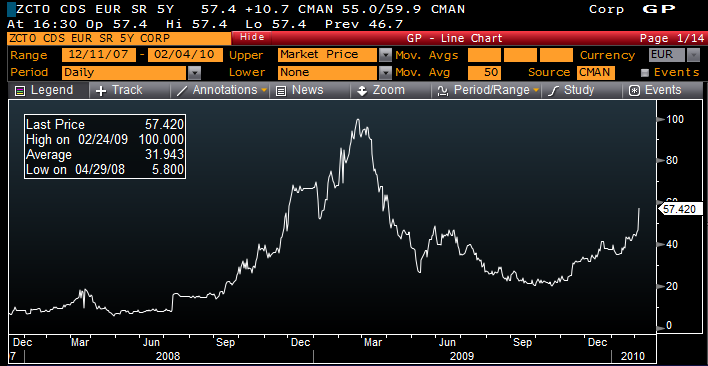The stakes are high not just for Greece but for the entire euro zone, where efforts to forge a common economic identity are threatened by the financial crisis. Last week, the panic spread to Portugal and Spain, and the cost of insuring their debt against a default soared to record levels as investors bet that, like Greece, governments in those countries won’t be able to rein in bloated budgets.
“The risk of contagion is a real one,” said Scott Thiel, the head of European fixed income at the asset management firm BlackRock in London. “Investor sentiment is now focused on countries like Spain and Portugal, where fundamentals are weakest.” He said that for now, he saw little risk for Italy, given the relative stability of its economy.
Non tutti sostengono che la via obbligata del governo greco siano i tagli e la recessione: un'eccezione notevole è data da Stiglitz, secondo il quale l'Europa dovrebbe intervenire e sostenere il governo greco:
 “What we learned in Asia in 1997 was that the advice of cut, cut, cut made recessions worse,” said Mr. Stiglitz. He said he has advised Mr. Papandreou to look for ways to stimulate the economy, such as increasing credit to small businesses, and said he believes Europe should be more aggressive in coming to Greece’s aid.
“What we learned in Asia in 1997 was that the advice of cut, cut, cut made recessions worse,” said Mr. Stiglitz. He said he has advised Mr. Papandreou to look for ways to stimulate the economy, such as increasing credit to small businesses, and said he believes Europe should be more aggressive in coming to Greece’s aid.Nel frattempo anche il debito U.S.A. è sempre più sotto osservazione, e i CDS raggiungono il massimo degli ultimi 9-10 mesi.
Krugman insiste tuttavia che non si tratta di un problema, almeno nel medio-breve termine:
Let’s talk for a moment about budget reality. Contrary to what you often hear, the large deficit the federal government is running right now isn’t the result of runaway spending growth. Instead, well more than half of the deficit was caused by the ongoing economic crisis, which has led to a plunge in tax receipts, required federal bailouts of financial institutions, and been met — appropriately — with temporary measures to stimulate growth and support employment.
The point is that running big deficits in the face of the worst economic slump since the 1930s is actually the right thing to do. If anything, deficits should be bigger than they are because the government should be doing more than it is to create jobs.
True, there is a longer-term budget problem. Even a full economic recovery wouldn’t balance the budget, and it probably wouldn’t even reduce the deficit to a permanently sustainable level. So once the economic crisis is past, the U.S. government will have to increase its revenue and control its costs. And in the long run there’s no way to make the budget math work unless something is done about health care costs.
But there’s no reason to panic about budget prospects for the next few years, or even for the next decade. Consider, for example, what the latest budget proposal from the Obama administration says about interest payments on federal debt; according to the projections, a decade from now they’ll have risen to 3.5 percent of G.D.P. How scary is that? It’s about the same as interest costs under the first President Bush.
I dati sull'occupazione USA di venerdì scorso
indicano un tasso di disoccupazione in calo dal 10% al 9.7%:
la situazione resta però molto grave e in molti pensano che questo miglioramento sia dovuto più alle incertezze legate al calcolo degli occupati, che diventano ancora più gravi al passaggio dell'anno (dicembre-gennaio), che non a un effettivo segnale di ripresa. Il grafico qui accanto, che confronta l'andamento dell'occupazione durante l'ultima recessione con quelle del passato, rende ancora più evidente quanto drammatica sia la crisi negli U.S.A.
Ecco l'aggiornamento al 5 febbraio 2010.
Per chi fosse curioso, ecco il comportamento delle 6 asset class durante la recente "correzione", cioè dalla chiusura dell'8 gennaio scorso:
| Euro Government Bond 30yr | EUR | 1.71% |
| Ftse EPRA/NAREIT Global | USD | -6.55% |
| S&P500 | USD | -6.88% |
| EuroStoxx | EUR | -11.38% |
| CRB | USD | -11.08% |
| Eur/USD | N/A | -4.61% |







Nessun commento:
Posta un commento